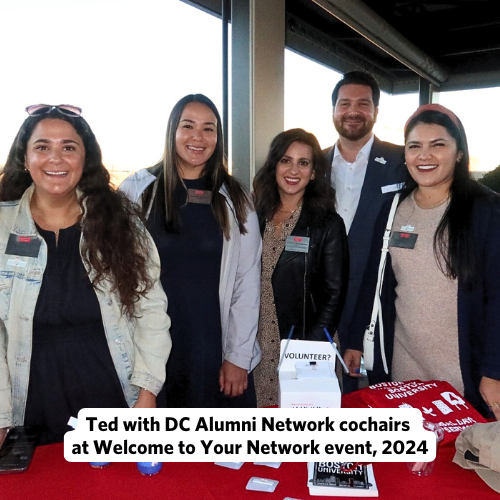Giving back and building community
Written by Rebecca Beyer (CAS’04) | Published June 2025

After Ted Fioraliso (COM’07) became cochair of the Washington, D.C. Alumni Network in 2023, his first assignment was organizing a watch party for that year’s Beanpot tournament, which pits the major Boston area college ice hockey teams against each other.
Looking for a location, he called Penn Quarter Sports Tavern, a bar near the National Mall. The owner and manager were thrilled to host—when the men’s team won the national title in D.C. in 2009, then-coach Jack Parker, a legend in the sport, signed a jersey for the bar.

“All these years later, it’s still there,” Fioraliso says, adding that the Beanpot is one of his favorite events of the year. “It brings out such a great group of alumni.”
Fioraliso has long been an active member of the D.C. Network; for several years, he has served as a mentor for or offered career advice to students who study in D.C. Now as cochair, he works with Associate Director of Alumni Networks Corinne Tramuta Moloney of the BU Alumni Association and his fellow cochairs to organize local events almost every month. For Fioraliso, volunteer work is a way to give back to the university where he built strong friendships and the foundation for a successful career in broadcast journalism and, more recently, public relations.
“I love giving back,” he says. “I really enjoyed my time at BU, and I try to make sure others are having a good time as alums. It’s a great way to share stories and build community.”
Fioraliso, who grew up on Long Island in New York, went to BU specifically for its College of Communication. From an early age, he had a fascination with the news business: in high school, in addition to writing for the school paper, he volunteered at the local public access station.
“I was chomping at the bit,” he laughs.

At BU, he hosted a radio show on WTBU, worked at BUTV10, and took courses with broadcast faculty including Susan Walker, Anne Donohue, and Richard Lehr. He also served as a teaching assistant for the late Jim Thistle, director of the broadcast program.
“[Thistle] was so well connected—he had been around the industry for so long,” Fioraliso says. “He also was just a kindhearted guy. Everybody loved him.”

After graduating, Fioraliso worked for local stations in Elmira and Rochester, New York, before taking a position as Washington correspondent for Lilly Broadcasting. Except for a two-year period working as a producer in New York, he’s been in the nation’s capital ever since, including his final role in broadcast journalism as a senior reporter and executive producer for the Washington bureau of Gray Television where he managed the newsroom and planned coverage of all major events, including debates, conventions, elections, and inaugurations. In his time in broadcast journalism, he interviewed cabinet secretaries, presidential candidates, and then-Vice President Kamala Harris. But the business changed during his career and not always for the better; Fioraliso lamented the increasing pressure to be live 24/7.
“It used to be that you came into the office, got your assignment, spent your day researching and talking to people about it, wrote your story, and then put it on the 6:00 news,” he says. “Now so much is live; it’s harder for reporters to do actual journalism. It’s very hard to just get up in front of a camera and talk without substantive information.”
In 2023, Fioraliso left journalism to take a position as vice president of content and strategy for the American Hotel & Lodging Association, helping the lobbying organization communicate the policy priorities of the hotel industry to its members and the public.
“I was a journalist for 15 years and am so proud of everything I accomplished, but, by the end of my tenure, I was ready for more of a work-life balance,” he says. “I had worked nights and weekends; I always felt I had to be read-in and couldn’t turn off. I wanted to pivot to something where I could still use my skills in a less stressful environment.”
The move coincided with his more active role for his alma mater, and he loves connecting with fellow BU graduates in different contexts.
“We try to be well rounded in terms of the events that we put on, so we bring out different groups,” he says. “The Beanpot brings out a certain group; our kayak night brought out a different group.”

He says the University’s use of BU Connects, the personal and professional networking platform for BU students, alumni, faculty, and staff, has helped improve outreach; at the network’s largest event in the fall, called Welcome to Your Network, about 200 people attended (there are about 19,000 alumni in the D.C. area). Fioraliso measures success not by numbers but newcomers; so far, at every gathering, someone has told him, “This is my first event.”
He says he enjoys seeing people bond over their shared experiences, “whether it’s living in a certain dorm or having a certain professor.” (Case in point: Fioraliso and this writer graduated three years apart but both lived in Sleeper Hall as freshmen and fondly remember classes with the late COM Professor Jonathan Klarfeld.)
“Even though BU is such a big school, it really feels small,” Fioraliso says. “You can speak to a recent graduate or someone who graduated 50 years ago; we’ve all had the same experiences.”
Regional Networks provide many opportunities to stay connected with the BU alumni community through online channels and in-person activities. See how you can get involved!
